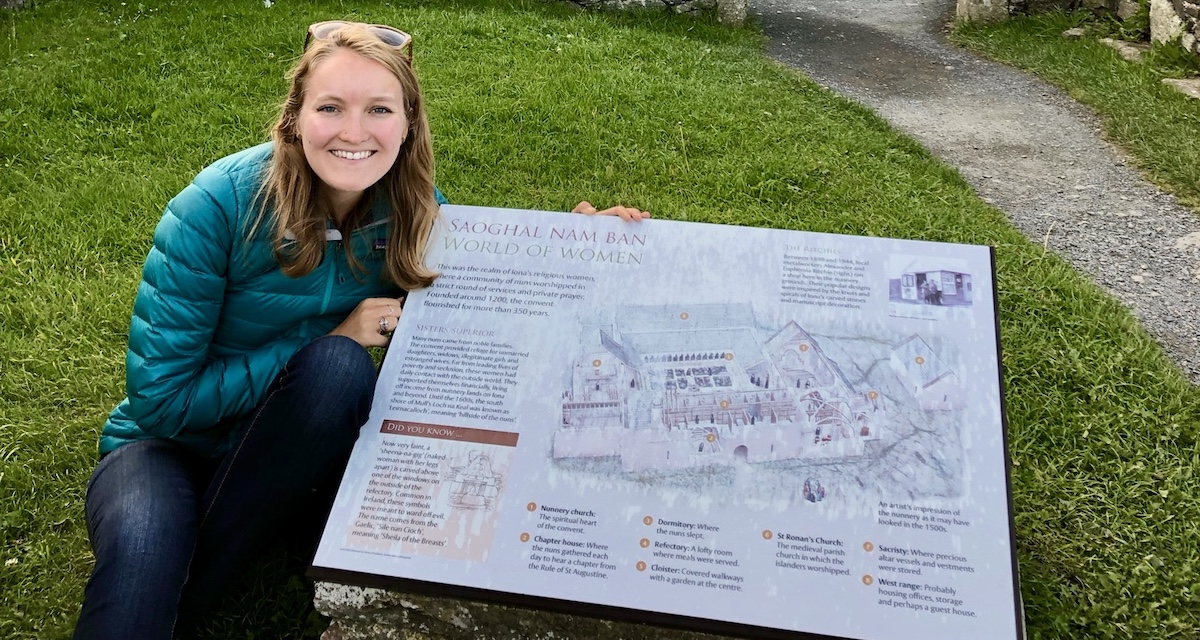Alumna Forges Academic Future as Lilly Graduate Fellow
Before the French Revolution, the invention of electric light or the 19th Amendment transformed history, hundreds of women trailblazed countercultural paths for themselves by pursuing an education in Latin. “How did that shape their lives?” considers Elspeth Currie ’16, who begins doctoral work investigating women’s intellectual history in early modern Europe at Boston College this fall. From participating in humanist epistolary networks to educating their own children in classical languages, advanced education changed the trajectory of life for these women.
Like them, academia is launching Currie into a prestigious opportunity with profound implications. Currie, an upper school teacher in Latin and history at Covenant Christian Academy in Peabody, MA, was recently named one of 10 Lilly Graduate Fellows. Now forming its 12th cohort, the program supports outstanding students pursuing graduate degrees in the humanities and arts, who want to explore the connections among Christianity, higher education and the vocation of the teacher-scholar.
“Elspeth’s acceptance into the extremely competitive Lilly Graduate Fellows Program is a testament to the high caliber of her work,” says Associate Professor of English Chad Stutz, a campus representative to the Lilly Program. “She is a top-notch student and aspiring historian who is passionate about the life of the mind, and we’re thrilled to see her continue the tradition of distinguished Gordon graduates who have participated in the program over the years.”
Currie, a history and classical studies Pike Honors graduate, looks forward to infusing both her personal intellect and professional pursuits with the questions that The Lilly Fellows Program engages: “What does it mean to think well as a Christian, and to formally learn as a Christian?” She says, “I’m hoping to become a more thoughtful teacher and a more thoughtful Christian at the end of the day.”
Funded by the Lilly Endowment Inc., Lilly Graduate Fellows cohorts comprise of candidates from the current 99 schools that make up the Lilly Network of Church-Related Colleges and Universities. Currie and her peers will meet regularly with cohort mentors Dr. Martha Eads of Eastern Mennonite University and Dr. Charles Strauss of Mount St. Mary’s University, attend four conferences, participate in a long-distance colloquium and receive three annual stipends to use at their discretion.
Currie’s time at Gordon was enhanced by other Lilly Endowment Inc. programming, the Jerusalem and Athens Forum and the Center for Faith and Inquiry. And studying abroad with Scholarship and Christianity in Oxford introduced her to the facets of history she now studies, as well as a general sense of calling to academia. Both experiences compelled her to participate at a new level of rigor in her academic journey—this time alongside doctoral studies. “I’m excited to have a more intentional setting to continue asking and dwelling on the types of questions that I think Gordon did a good job introducing students to,” she says.
Another aspect of the Lilly Fellows that drew Currie in is the richness of its interdisciplinary nature—it was one of her favorite parts of earning her master’s degree in women’s studies at Oxford University. “We had philosophers and English students and historians and social scientists all together. That mix of attitudes and approaches I just find really fruitful. I enjoy getting that broader perspective.”
As Currie looks forward to delving into centuries of sources that reveal the experience of women who forged new avenues in society, she is empowered by the foundation they lay. “Despite the barriers that early modern society placed before women with advanced educations—being discouraged from publishing and barred from the male professional spheres of intellectual engagement, paradigmatically politics, church, medicine and law—these women created opportunities to nurture the life of the mind,” says Currie. “As humans, as bearers of the image of God, women participated actively in society. It’s what we all do, responding to our world in various creative ways.”
 The Bell
The Bell